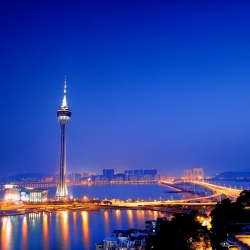When Rob Goldstein engaged in a question-and-answer session at the Bank of American-Merrill Lynch 2015 Gaming and Lodging conference today in New York City, he was asked about the junket operations of Macau.
The answer the Las Vegas Sands president gave was stark and honest: “the junket model, for now, is broken.”
That sums up a 20-plus month trend in the Macau casino industry, which has had tremendous reverberations in the American gambling industry. Three of the U.S. big four Las Vegas casino companies–Las Vegas Sands, Wynn Resorts, and MGM Resorts–are heavily invested in the Macau gambling industry. All three of them have seen their stock prices take hits of 30% to 40% over the past year, as Macau’s meltdown continues. With news this week that a Wynn Macau junket operator was the victim of a $258 million robbery, Wynn Resorts stock prices fell an additional 5%.
Junket Indudstry Is Wrecked
Mr. Goldstein admitted he could see little chance that the junket industry of Macau would ever reach the level at which it once sat, but junkets were only one of several factors he blamed for the revenue free fall.
Describing an “incredible 12-month cycle of pushback”, Goldstein listed the liquidity troubles of the junket operations, but also listed Beijing’s restrictions on entry visas, a city-wide smoking ban at casinos, and a crackdown on money movement to discourage money laundering as other factors in the city’s decline.
Cycles Come and Go
Trying to be philosophical, Rob Goldstein mentioned that “cycles comes and go”, suggesting Macau’s casino industry should make some kind of recovery in the future. At the same time, the LVS president told attendees that, from his perspective, it is “hard for me to see a catalyst to make VIP get strong again”.
Despite the troubling turn of events in Macau, the LVS president believes Sands China is going to be able to shield itself from the worst fallout from Xi Jinping’s wide-ranging anti-corruption crackdown. His optimism is the result of Sands China’s focus on the mass market, as well as the VIP high rollers who once put Macau casinos over the top.
Chinese Mass Market Gamblers
The mass market (casino talk for “Chinese middle class”) is going to keep Sands China sound, said Goldstein. He added, “We still think our model works today, worked yesterday; it just worked better a year ago,” he told the assembled. When discussing possible competitors, who might not have planned for this eventuality, Goldstein said, “A model built on the very, very high end is more troubling right now.”
The numbers continue to be bleak, by any standards. August 2015 included a 30% drop among the mass market and a 40% decline among the VIP gamers. The total fall was 35% for the month. Such numbers are expected through the end of the year, because the statistics measure the year-to-year revenues.
Deutsche Bank Predictions
Deutsche Bank estimates a similar set of losses in September 2015. The German financial institution estimates a September decline of 35.2%, while it predicts the mass market to lose 27% and the high roller sector is going to experience a 41.8% drop.
Sanford C. Bernstein Statistics
Sanford C. Bernstein Ltd had reported a temporary turnaround in over the weekend, which had sparked some hope of a more general turnaround by some media sources. In truth, the 14% increase over the weekend represented a 3-day weekend in which the Chinese were celebrating the 70th anniversary of the end of World War II. Those do not represent repeatable numbers, but a simple holiday bump.
2016 Casino Openings: Good or Bad?
This is a time of many questions for investors in Wynn Resorts, MGM Resorts, and Las Vegas Sands. All three have new casinos which are supposed to open on the Cotai Peninsula in the next year. Those multi-billion dollar developments were designed to attract high rollers to the hippest new gaming locations in Macau.
While construction continues, all three companies have had to redesign their complexes and marketing strategies to appeal to the Chinese middle class. Lawrence Ho recently complained that Macau is not Las Vegas and non-gaming amenities never can replace gambling. If those investments are to pay off, Rob Goldstein suggests that factors besides VIP gamblers are going to have to fill the breach. The question for investors in the Macau gaming sector is going to be: will the new casinos make matters better or worse?

